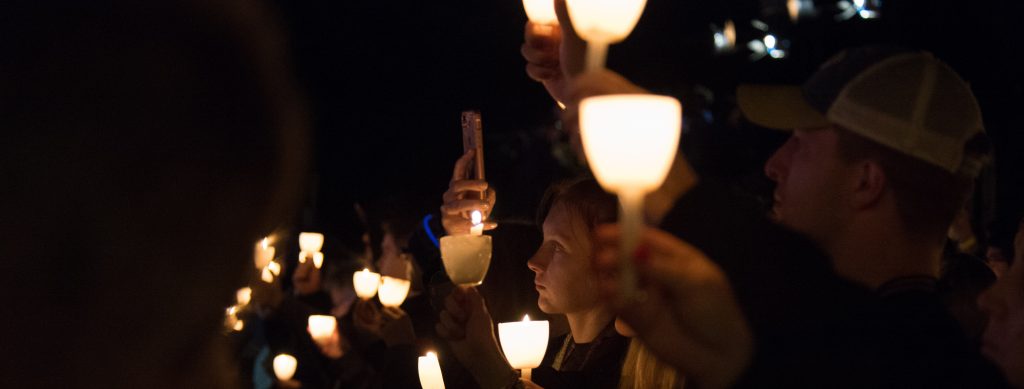I first learned of the Las Vegas shooting when I received a “breaking news” alert on my phone, late at night as I was going to bed. After glancing at the notification — a vague, “Shooting broke out in Las Vegas. Casualties reported.” — I remember choosing not to open the story. I remember thinking briefly, oh how sad, before putting aside my phone and falling asleep. ![]()
I’m horrified, in retrospect, that I felt no urgency as I read this latest mass shooting headline. Perhaps it says something terrible about me, or about our current political moment, that I felt inured to such tragedy — that the news of Las Vegas didn’t feel especially tragic or shocking, until I learned the extent of the carnage the next morning. That had this not been the deadliest mass shooting in recent memory, it would have merely been, rather perversely, an “ordinary” one.
As millennials, being plugged in to social media and the internet has made us more aware, but perhaps not more empathetic or authentic in our grief. I think it has made us exhausted. I think it has made it increasingly difficult for us to summon anger, tears or the will to act.
In part, this desensitization and news fatigue is inevitable. We receive Twitter alerts and breaking news emails, watch the same video clips and images on loop, share charged articles on Facebook and see our friends change their profile pictures in solidarity with the most recent cause. We are confronted with tragedy at every turn, and it has become near impossible to avert our gaze — perhaps to the detriment of our mental health.
It is hard enough to mourn in private, and harder still to navigate the politics and performativity of mourning at the office, on our social media profiles or in the presence of friends. Are we obligated to retweet something, anything, in the aftermath of a tragedy? Is neglecting to share a GoFundMe link, online petition or hotline indicative of indifference? Is it problematic to say nothing at all?
Unspoken pressures and norms about how to express our grief abound. And it is especially hard to feel like we must engage and be tuned into what’s going on, without ever being able to take a breath or pause to process. This is where self-care comes in.
Much has been written on the importance of self-care (both in your personal life and in the workplace) — the concept of consciously tending to your well-being and mental health. This can mean making sure to get enough sleep, giving ourselves a break to de-stress or even treating ourselves if we’re feeling down. But it is also worth considering how the idea of self-care extends to how we engage with current events and think about our emotional bandwidth.
Here are some ways to recharge and practice self-care in the aftermath of a tragedy:
- Keep your basic needs in mind. Self-care means more than just treating yourself to a massage or retail therapy. Make sure that you’re being mindful of the basics of self-care and try to keep to a normal routine: stay hydrated, eat nutritious meals, take a hot shower and make sure you’re getting some sleep. If you’re able to do so, going outside for a walk or a quick jog can also be a great way to clear your head. You can also try some grounding exercises, like deep breathing or meditation.
- Unplug or limit your screen time. It’s easy to get lost in your Facebook feed, engage in fruitless debates in the comments section or stay glued to the news channel for hours on end. But being bombarded with traumatic images non-stop can take a toll and lead to worsened feelings of helplessness, anxiety or depression. Remind yourself that it’s okay to close out of Twitter and not check the news for a couple of days. If your work requires you to be online, try limiting your news or social media consumption to specific times throughout the day.
- Spend time with people you care about. If you’re feeling overwhelmed or isolated, it’s important to reach out. You don’t even have to talk about the event — simply calling a family member to catch up, going out to lunch with close co-workers, spending time with friends or seeing a trusted professional can be helpful. Similarly, if you know someone who is going through a tough time or might be feeling alone, take a moment to check in and see if you can provide support.
- Take a personal day and work from home if you need to. Depending on your life experiences, these tragedies can be triggering or otherwise hit close to home. Ashley Weatherford, for example, wrote a powerful piece after the murders of Alton Sterling and Philando Castile, on coping and “surviving suffocating sadness” as a Black woman. She took a personal day to take time to process, read a good book, watch TV and eat ice cream. If it would help, try to distract yourself with these kinds of activities and give yourself a much-needed mental break.
The past few months have seemed especially draining, from the events in Charlottesville, to the unfathomable destruction caused by Hurricanes Harvey, Irma, Jose and Maria, to the earthquakes in Mexico, to the most recent massacre in Las Vegas and the hundreds of other mass shootings that have transpired in 2017 alone. We have a human impulse to empathize with those who are suffering, which means we face an almost constant, unrelenting cycle of outrage, emotional fatigue and sadness.
Remember that your feelings are valid, whether you feel totally numb or more emotional than usual. Self-care looks different for everyone, but it’s important to take care of yourself and give yourself time to heal. Figure out what practices makes you feel better and take the time to do them.
